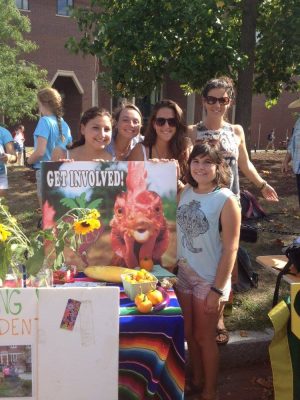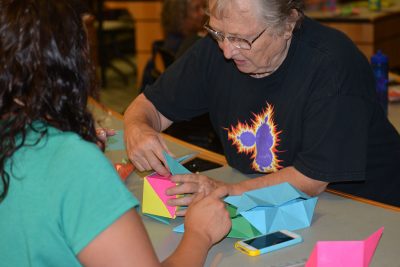Bulkeley High School (Neag School alum Sarah Hodge ’15, ’16 gives graduation address at her alma mater, Hartford’s Bulkeley High School)
U.S. News & World Report: Neag School Ranks Among Nation’s Top 20 Public Graduate Schools of Education
Students, New Teachers Learn Together at NFA STEM Summer Camp
The Bulletin (Students from Neag School’s TCPCG program get hands-on experience through Norwich Free Academy’s summer STEM program)
10 Questions With Kelsey Karp, Aspiring Agriculture Educator

In this new series, the Neag School will be catching up with students, alumni, faculty, and others throughout the year to give you a glimpse into their Neag School experience and their current career, research, or community activities.
Here, Kelsey Karp ’16 (CAHNR) — an aspiring agriculture educator currently enrolled in the Neag School’s Teacher Certification Program for College Graduates (TCPCG) in Waterbury, Conn. — shares insights into her time at UConn, where she was an animal science major with a minor in food science. She spent her last year as an undergraduate living and working at UConn’s Spring Valley Student Farm, a community that provides UConn students with the opportunity to gain firsthand knowledge and skills in organic farming — planting, growing, and harvesting produce for UConn’s own Dining Services.
Through TCPCG, an 11-month program designed for college graduates looking to earn teacher certification, Karp is getting one step closer to fulfilling her ambition to become an educator.
Learn more about TCPCG — as well as dates for upcoming information sessions — here.
Hometown: Newtown, Conn.
When I graduated from UConn: May 2016
The best part of being a student working on the farm: We are like a little family. All of the student farmers are like siblings to me. It is a great support system, and we all enjoy working with one another. As student farmers, we reach out to the UConn community by tabling different events, such as spring fling, fresh check day, involvement fairs, etc. We all are passionate about sustainable farming and love to communicate what we do at Spring Valley Student Farm.
What surprised me most about farming: You would think that there is nothing for farmers to do in the winter time; however, the amount of time and thought that goes into seed orders and crop rotation will blow your mind!
“Being an intentional teacher is a teacher who accommodates and challenges all of their students. A great teacher should ignite a passion for learning and foster new interests in their students.”
Best part of TCPCG so far: I’ve just completed the first of four sessions and already feel so much more prepared to become a teacher. It has been a lot of work but completely worth every bit. The Waterbury [campus] cohort is only 15 students, and we all have become very close. We communicate and work well with each other. Having such a supportive and encouraging group of classmates and professors is amazing.

What I believe makes a great teacher: Being an intentional teacher is a teacher who accommodates and challenges all of their students. A great teacher should ignite a passion for learning and foster new interests in their students. Teachers should motivate their students to strive for success. Great teachers pave a path for students that will help them follow the road to assist them in gaining the skills they need for the career they are looking to pursue.
My greatest accomplishment: I am very proud of how much I immersed myself in the agriculture community at UConn. I was the vice president of UConn Dairy Club, fundraising chair of UConn Block N Bridle, EcoHouse mentor, dairy herdsman, student farmer at SVSF, etc. As a future agriculture educator, I will continue to be involved in the world of agriculture.
My greatest role model: My parents are both my greatest role models. They both are very hard workers and have taught me to be a hard worker. Without them I would not be the person I am today. They have helped me achieve everything that I’ve wanted to and continue to encourage me to go after my goals.
Something you don’t know about me: I am a huge Elvis fan, Zumba enthusiast, and pizza lover!
Favorite UConn Dairy Bar ice cream: Banana chocolate chip
Read other installments of the 10 Questions series here.
Connecticut Sports Talk, July 11
Nutmeg Sports (Neag School graduate student, Casey Cochran, is interviewed about the article in The Player’s Tribune and his experiences with concussions)
New Faculty Projects Will Advance Academic Plan
UConn Today (Neag School’s Sandra Chafouleas, Joseph Madaus, and Glenn Mitoma are partnering with new programs throughout UConn)
Shortcomings in “Efficiency Scores” and Logic Weaken Charter School Report, Says NEPC Review
Benzinga (Neag School’s Casey Cobb provides feedback on a Milwaukee charter school report)
13 Concussions

Editor’s Note: In this piece written for Players’ Tribune, former UConn football star Casey Cochran ’15 (CLAS) — currently a graduate student in the Neag School’s sport management master’s degree program — shares, in his own words, the story of enduring his 13th concussion, an injury that ultimately prompted him to end his ambition of playing professional football. Today, Cochran is working to advocate for greater awareness about head trauma and concussions in sports.
The only word I know to describe the first few moments after a concussion is limbo — there are a few moments between the world that you were just a part of and your new brain-injured reality. When I regained consciousness, I knew I was on the ground. My head was seized with tremendous pressure, and that same awful, familiar depression from previous head injuries came over me — like a dark, heavy blanket, swallowing me up.
I tried to fight it: Just get up. Get the hell up!
I opened my eyes. My distorted vision quickly came back to focus, and I saw high-powered stadium lights shining on me.
They asked question after question. I responded to most of them with, “Yeah, yeah, I’m fine.” But I knew immediately that I was not. I knew I had just played the last snap of my career.
I realized I was at the game. The other team was celebrating like maniacs so I knew that my pass had fallen incomplete. Hands helped me up, and some of my teammates surrounded me out of concern. As I began to jog off the field, I turned to my teammate and asked what happened. Through his facemask, I could see a confused look. I then realized that my words weren’t coming out in English. After a second or two of unintelligible blabber, I was able to say, “What happened?”
“It was incomplete. You alright?” he responded.
My vision blurred again. Once I got to the sideline and I was met by teammates and doctors. They asked question after question. I responded to most of them with, “Yeah, yeah, I’m fine.” But I knew immediately that I was not. I knew I had just played the last snap of my career.
Read Casey Cochran’s full story on the Players’ Tribune site here. He also has made appearances to discuss life after concussions in college sports on Fox 61’s Morning Show, at SXSW, and continues to do so in other venues nationwide. Listen in here to Cochran discuss this story with HAN Network’s Nutmeg Sports.
Barnes Foundation Creates Opportunities for Connecticut Teachers to Participate in Summer Enrichment Program

Over nearly four decades, a total of more than 26,000 educators have convened on the UConn Storrs campus for Confratute, a weeklong summer institute that provides educators with practical strategies for engagement and enrichment learning for all students. Thanks to support from one philanthropic family institution known as the Barnes Foundation, close to 100 attendees have been able to attend Confratute over the past three years — including this summer’s program, which marks Confratute’s 39th year. The Barnes Foundation, whose goal is “giving to promote excellence in education with an emphasis on programs that benefit students in grades kindergarten through high school,” has contributed a total of $50,000 since their support began in 2014.
“The funding provided by the Barnes Foundation has supported teachers and administrators from schools that serve low-income students to participate” in Confratute, says Joseph Renzulli, co-creator of Confratute and director of the Neag Center For Creativity, Gifted Education, and Talent Development. “For these educators, bringing the tools of an enriched and challenging curriculum back to their schools helps to provide equal opportunities for all students in our state to be prepared for matriculation to higher education.”
If not for the Barnes Foundation and their continued philanthropy, Confratute participants from many towns — including Hartford, New London, Manchester, New Haven, Norwich, and Windham — would not have otherwise had the funding to gain access to the weeklong program and its resources. In addition to networking with fellow educators, Confratute attendees have the opportunity to interact with representatives from the Barnes Foundation, who come to Confratute to meet with educators, attend sessions, and learn more about the experiences of the teachers whom the Barnes Foundation supports.
Confratute, which is known as a “combination of a CONference and an instiTUTE, with a strong emphasis on FRAternity in between,” has been held at UConn since 1978 and has had upwards of 26,000 participants. It is sponsored by the Neag Center for Creativity, Gifted Education, and Talent Development, which is housed in the Neag School of Education.
The creators of Confratute, Joseph Renzulli and Sally Reis, designed this professional development program to help educators from around the world come together to learn about the Schoolwide Enrichment Model, which provides best practices in enrichment learning and teaching; differentiation; strategies for high engagement and creativity; meeting the needs of gifted and talented students; and using technology to personalize instruction.
For attendees, the weeklong classes, known as “strands,” are taught by educators well-versed in the Schoolwide Enrichment Model (SEM) and who teach all over the country and in locations around the world.
Strand topics range from personalizing learning to a process known as “infusion,” which allows for students to have enrichment activities as a part of any and all regular curriculum topics. Among Confratute’s 50-plus sessions are Math for Those Who Think They Can’t Do Math; Storytelling, Mime and Movement; CSI: Forensic Science in the Classroom; and Books That Inspire and Guide.
Learn more about Confratute here. Or, explore our photo album from last year’s program.
Ronald Beghetto – Big Wins, Small Steps: How to Lead For and With Creativity
Principal Center Radio (Neag School’s Ron Beghetto discusses his new book “Big Wins, Small Steps: How to Lead For and With Creativity”)
